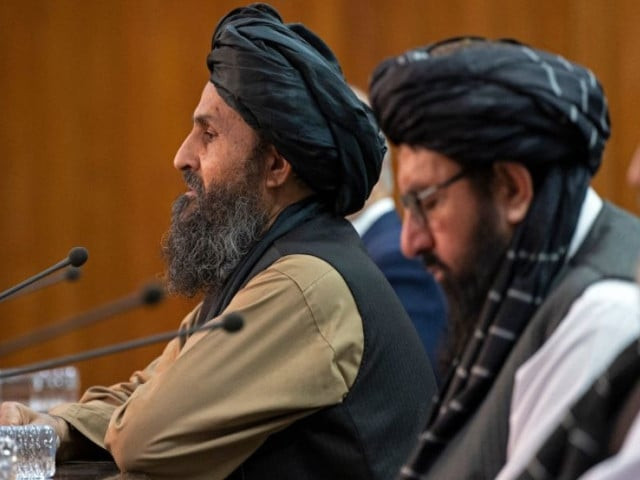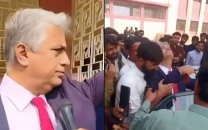Pakistan gets ‘fresh commitment’ from Afghan Taliban on TTP
Officials confident the outcome of the high-level visit would be visible in coming weeks

Pakistan managed to secure “fresh commitment” from the Afghan Taliban on tackling the renewed threat posed by banned Tehreek-e-Taliban Pakistan (TTP) after a high-level delegation led by the country’s defence minister visited Kabul on Wednesday, according to officials familiar with the development.
Khawaja Asif was accompanied on previously unannounced visit to the Afghan capital by Director General Inter-Services Intelligence (ISI) Lt General Nadeem Anjum, Foreign Secretary Asad Majid and Special envoy on Afghanistan Ambassador Muhammad Sadiq.
“The visit went well. The outcome was very positive,” said an official, who has direct knowledge of the trip while requesting anonymity. The official added the Afghan side was receptive to Pakistan’s concerns with regard to the TTP.
Read more: Pakistan delegation visits Kabul to discuss security concerns
Another official confirmed the development and said the Afghan interim government shared details of certain actions it took against terrorist groups including TTP affiliates.
The visit came against the backdrop of a surge in terrorist attacks in Pakistan. The recent terrorist attacks in Peshawar Police Lines and Karachi Police Office compelled Pakistani authorities to reach out to the Afghan Taliban.
Officials said that the Pakistani side conveyed its concerns and told the Afghan interim government that the policy of holding talks with the TTP was over. “They (Afghan Taliban) have not insisted either on talks,” said the official.
Officials were confident that the outcome of the high-level visit would be visible in coming weeks as Pakistan expects certain actions by the Afghan Taliban against terrorist outfits operating out of Afghan soil.
Previous efforts to convince the Afghan Taliban for decisive action against the TTP could not succeed. The Interim government instead of taking action against those groups encouraged Pakistan to enter into talks with the TTP. The talks did produce some results initially with a ceasefire but the move backfired as TTP used that break to regroup and mount deadly attacks later.
A statement issued by the Foreign Office clearly indicated the main purpose of the Pakistani high-level delegation to discuss the TTP challenge.
The statement did not mention other members of the delegations but the DG ISI, foreign secretary and special envoy could be seen in the picture released by the Afghan side.
The delegation met senior leadership of the Interim Afghan government including Deputy Prime Minister Mullah Abdul Ghani Beradar Akhund, Defence Minister Mawlavi Mohammad Yaqoob Mujahid, Interior Minister Sirajuddin Haqqani and Foreign Minister Amir Khan Muttaqi.
Read: Bajwa wanted to ‘resettle’ Pakistani Taliban
“Matters relating to the growing threat of terrorism in the region, particularly by TTP and ISKP came under discussion. The two sides agreed to collaborate to effectively address the threat of terrorism posed by various entities and organisations,” according the foreign office statement.
Both sides agreed to strengthen bilateral cooperation in various fields to further enhance the fraternal relations between the two countries, it added.
However, a separate statement issued by the Afghan government did not mention the issue of TTP. Instead, it focused more on trade and economic issues.
“The two parties discussed economic cooperation, regional connectivity, trade, and bilateral relations,” the Afghan official statement said.
"Pakistan and Afghanistan are neighbours and should get along well. The Islamic Emirate of Afghanistan emphasises the development of commercial and economic ties with Pakistan as they are in the interest of both countries,” the statement quoted Mullah Baradar as saying.
In addition, Mullah Baradar said that political and security concerns should not affect business or economic matters. He further added that the Islamic Emirate calls on Pakistan to release Afghans being detained in detention facilities in Pakistan.
He further added that passengers at Torkham and Spin Boldak should be well-facilitated, with special consideration being given to emergency patients.
The Pakistani side assured the Islamic Emirate of Afghanistan of the aforementioned issues and added that the concerned ministries and appointed committees would soon work.
The visit came at a time when the Afghan side closed the main border crossing between Pakistan and Afghanistan at Torkham. Kabul shut the crossing, used both for trade and travel, under the pretext that Islamabad reengaged on its commitment.
There were reports that Afghanistan accused Pakistani authorities for imposing an unannounced ban on the entry of Afghans seeking medical treatment. There was no official confirmation from the Pakistan side.



















COMMENTS
Comments are moderated and generally will be posted if they are on-topic and not abusive.
For more information, please see our Comments FAQ